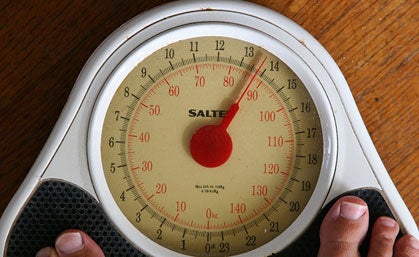The Skinny on Being Skinny

Unhealthy calorie restriction in the running community
Photo by puuikibeach, licensed through the Creative Commons
I’ll admit it: I like to restrict calories.
Well, I don’t “like” to restrict calories; I do it because I want to maintain my ideal racing weight. Too many calories could add pounds, which would hamper my running ability—right? Actually, it just makes me hungry and think about food constantly; I bonk while training and make slow fitness gains with frequent setbacks. I am diligent about packing fuel for training runs, yet almost always fail to consume adequate amounts—a vicious cycle of disordered eating.
Many women, and quite a few men, too, chronically engage in this behavior, believing it will make them faster, leaner and more attractive. Charging uphill, after all, is easier with less weight, while muscle damage is reduced on the trot down the other side. Women who weigh less than 1.9 pounds/inch in height and men who weigh less than 2.1 pounds/inch tend to be better climbers—less likely to feel as though they’re doing a squat workout with a child on their shoulders.
Rationally, I understand that being 5’6” and 120 pounds. is an acceptable weight for a female, but I have intense trepidation of adding just one pound. If I’ve kept my calories to a minimum, I feel svelte and proud. While pro athletes regularly undergo weigh-ins and body-composition evaluation by physicians hired to keep their bodies primed for competition, I have no such data to keep me in line; I have only a scale, nutrition labels and pessimistic thoughts. I have a propensity to compare my physique to other women runners, often ignoring my actual performance in favor of my visual expectations for myself.
What to do about this terrible business of finding our optimal weight for performance without disturbing the body’s wellness? Be aware that trying to decrease weight when you’re already close to optimal size often leads to illness or injury. If you don’t maintain adequate caloric intake to match the stress of training, you’re likely to lose muscle mass. Severe calorie restriction can also lead to malnutrition; symptoms include fatigue, weak muscle contraction, anemia, frequent injuries, brittle bones, sleep disturbances, fertility complications and slow recovery from training.
When a woman under-eats, her menstrual cycle and energy levels can experience drastic, negative consequences. Estrogen production is halted under high levels of bodily stress, putting a woman at increased risk for osteoporosis and injury. In fact, restricted calorie intake is a higher risk factor than low body fat in and of itself; recent studies show that as long as calorie consumption is adequate, women can healthily maintain low body-fat percentages equal to athletic men.
Evaluating body composition—the ratio of fat to muscle—is more valuable than considering weight alone. Exercise often increases our weight, due to muscle development and increased blood volume; fitness levels can change drastically without the scale registering anything. Consuming adequate protein can help you lower body fat while maintaining muscle mass.
Though not every runner experiences the perverse inclination to severely restrict calories, many do. In a culture abundant with excess, it can feel exhilarating to be in control and lauded for your ability to resist. I’m overwhelmed by guilt if I stray from my diet of fiber and sugar-free protein bars. A competitive spirit can easily turn into extremism and self-imposed dogma—the idea that nothing is ever enough. Not enough miles, not enough intensity, not enough races.
This excess can creep up insidiously. Our obsessive behavior, often positively reinforced by an environment that venerates competition, has become a psychological myopia. Perhaps the quick fix is having a professional tell you to eat more; the truth is many of us would like to feel good about eating an occasional cheeseburger or ice cream cone.
Opening conversation about something so stigmatized could help alleviate the prevalence of disordered eating in the running community. Understanding that a few extra pounds could actually promote health and strength, leading to faster times and fewer injuries, will hopefully help eradicate the issue. Constant anxiety is cumbersome; replenishing your body should come naturally, not because of what you did that day, but because if your body is asking for food, it needs it.
I remind myself that indulging in “normal people” food a few times a week will make me a better runner–and less of a pain in the ass to take out to dinner. Instead of sitting rigidly and picking away at pieces of fat, or pretending I’m not hungry enough to eat the entire meal, I breathe and engage in a small inner dialogue: “It’s OK, you are getting stronger and will be happier.” Permit yourself to eat by reminding yourself of why you’re running and racing in the first place: joy.
—
Original piece written by Tanya Davis and appeared at Inside Trail Racing.